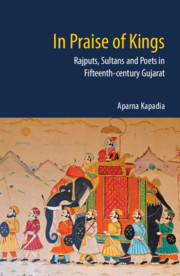Book contents
- Frontmatter
- Contents
- List of Maps
- Acknowledgements
- A Note on Transliteration and Usage
- Map
- Introduction
- 1 Setting the Stage: Contextualising Fifteenth-century Gujarat
- 2 Ranmallachanda: A Warrior Imagined
- 3 Gangadhara's Oeuvre: Cosmopolitan Poetry for Local Kings
- 4 Rājavinoda: The Sultan as Indic King
- 5 Rās Mālā: Re-Discovering a Warrior Past
- Conclusion
- Bibliography
- Index
3 - Gangadhara's Oeuvre: Cosmopolitan Poetry for Local Kings
Published online by Cambridge University Press: 20 October 2018
- Frontmatter
- Contents
- List of Maps
- Acknowledgements
- A Note on Transliteration and Usage
- Map
- Introduction
- 1 Setting the Stage: Contextualising Fifteenth-century Gujarat
- 2 Ranmallachanda: A Warrior Imagined
- 3 Gangadhara's Oeuvre: Cosmopolitan Poetry for Local Kings
- 4 Rājavinoda: The Sultan as Indic King
- 5 Rās Mālā: Re-Discovering a Warrior Past
- Conclusion
- Bibliography
- Index
Summary
Oral narratives and written works inspired by oral traditions were crucial to the process through which local Gujarati chieftains imagined and represented their political aspirations during the ferment and flux of the fifteenth century. Such works, expressed in the regional language, were one means of self-fashioning for chieftains and for their fortified kingdoms, but other artistic narrative forms proved useful as well. Two significant works in Sanskrit, one from the court of the Chauhans of Champaner and another from that the Chudasamas of Junagadh, along with a variety of inscriptions on stone, suggest that, in their quest to affirm their political and social positions in the wake of the growing imperial power of the sultans at Ahmadabad, the warrior chieftains drew on classical courtly models of kingship that had evolved all over north India from the seventh century, or post-Guptaperiod, onwards. They did this by deploying the aestheticised Sanskrit literary tradition.
This chapter focuses on these two Sanskrit narratives, both of which were composed by a poet named Gangadhara who travelled to Gujarat sometime during the mid-fifteenth century from Vijayanagara in south India. The first of these is a play entitled Gangadäsapratäpaviläsanätaka or ’the play on the glory of Gangadas'1 about the then-ruling chieftain of Champaner in northeastern Gujarat. In this composition, which follows the conventions of classical Sanskrit drama, the poet narrates the Chauhan king's campaign against, and subsequent victory over, the Ahmadabad sultan. The second work is Mandalikanrpacarita or ‘biography of king Mandalik’, a mahakavya or epic poem eulogising the Chudasama king, Mandalik, of Junagadh in the Saurashtra peninsula. In both works, Gangadhara displays his competence as a poet trained in the classical Sanskrit literary traditions, and fashions his patrons as ideal rulers in the style of older Puranic kings. Yet, in their contents and concerns, the compositions remain securely rooted in their specific spatial contexts of Champaner and Junagadh, two significant kingdoms that were located on the periphery of the Muzaffarid sultanate's heartlands, and in the historical moment of their interactions with the regional sultans who, by first half of the fifteenth century, had become the indisputable masters of the region.
- Type
- Chapter
- Information
- In Praise of KingsRajputs, Sultans and Poets in Fifteenth-century Gujarat, pp. 76 - 102Publisher: Cambridge University PressPrint publication year: 2018



